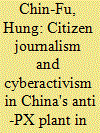|
|
|
Sort Order |
|
|
|
Items / Page
|
|
|
|
|
|
|
| Srl | Item |
| 1 |
ID:
122988


|
|
|
|
|
| Publication |
2013.
|
| Summary/Abstract |
Using the case of the Xiamen anti-paraxylene (PX) plant movement, this article investigates the evolving phenomenon of citizen journalism with Chinese characteristics in the information age, with a focus on ICT-empowered environmental activism and the implications of citizen journalists on China's sociopolitical development. It is argued that enhanced public participation and environmental rights defences are developing effectively in China. The increase in alternative information available online through internet-mediated bloggers as well as citizen journalists is posing a formidable challenge to both the Communist Party of China's propaganda-filled media environment and its effective governance. Furthermore, the net's sociopolitical impact in China will be shaped and determined less by the intrinsic nature of the internet itself than by the underlying political dynamics of public opinion, civil participation, citizen journalism and cyber-activism.
|
|
|
|
|
|
|
|
|
|
|
|
|
|
|
|
| 2 |
ID:
133651


|
|
|
|
|
| Publication |
2014.
|
| Summary/Abstract |
We analyze forms of environmental activism that eschew the "information and socialization" politics typically associated with Transnational Advocacy Groups (TAGs) and instead favor direct, confrontational strategies, whose aim is to enforce international law. While mainstream TAGs typically seek influence through norm entrepreneurship, lobbying or "naming and shaming", what we label Direct Enforcement (DE) intervenes directly to halt (purportedly) illegal practices by states and private actors. DE activism has been most visible in transnational campaigns to protect endangered marine species, where environmental groups have resorted to damaging equipment used for illegal fishing and boarding fishing boats to enforce maritime conservation law. Often branded as eco-terrorism, such confrontational strategies have been largely ignored by scholarly literature on transnational activism. We contend that DE merits closer attention by IR-scholars for two reasons. First, DE activism plays an important role in enhancing the compliance pull of international laws in an area-the global environment-where states often lack capacity and political will to enforce international agreements. Second, an analysis of DE-activism provides important insights about issue selection and relative campaign success under different structural circumstances, thereby expanding our understanding of transnational advocacy more generally.
|
|
|
|
|
|
|
|
|
|
|
|
|
|
|
|
| 3 |
ID:
160118


|
|
|
|
|
| Summary/Abstract |
In recent years, satellite imagery, previously restricted to the defence and intelligence communities, has been made available to a range of non-state actors as well. Non-governmental organisations, journalists, and celebrities such as George Clooney now use remote sensing data like digital Sherlock Holmeses to investigate and reveal human rights abuses, political violence, environmental destruction, and eco-crimes from a distance. It is often said that the increasing availability and applicability of remote sensing technologies has contributed to the rise of what can be called ‘satellite-based activism’ empowering non-state groups to challenge state practices of seeing and showing. In this article we argue that NGO activism is not challenging the sovereign gaze of the state but, on the contrary, actually reinforcing it. We will bolster our arguments in this regard in two prominent fields of non-governmental remote sensing: human rights and environmental governance.
|
|
|
|
|
|
|
|
|
|
|
|
|
|
|
|
|
|
|
|
|